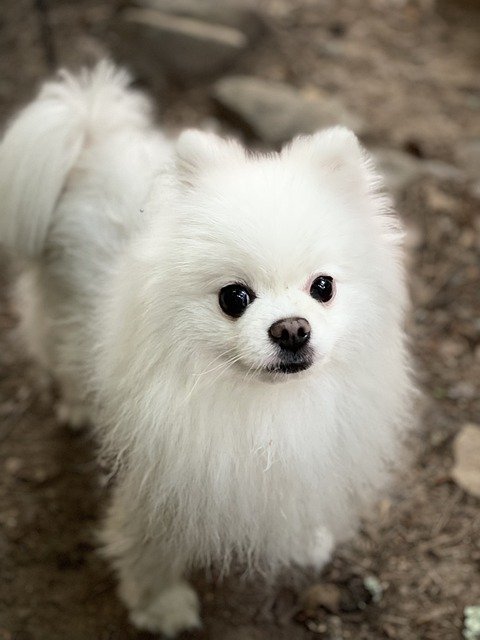Pomeranians aren’t hypoallergenic dogs but are also not the most allergenic breeds.
So, while not ideal for people with severe allergies, the Pomeranian may be a tolerable breed for those with minimal allergy symptoms.
A select group of dog breeds is labeled as “hypoallergenic” because of their shedding patterns and the allergen-inducing proteins they naturally produce.
These breeds include:
- Poodles
- Bichon Frise’s
- Maltese
- Schnauzers
The Pomeranian is not one of these hypoallergenic breeds, but they fall on the lower end of the shedding and protein production scale.
The Pomeranians’ Coat
The Pomeranian has a plentiful thick double coat that is noticeably fluffy but still strong despite being soft to the touch.
The bottom layer of the Pomeranian’s coat or the “undercoat” provides insulation – in the warmer months, the undercoat protects the skin from the sun’s heat.
In the Winter, the undercoat provides added insulation to trap warmth.
When the Pomeranian sheds, most of the hair that is lost comes from the undercoat.
The top layer of the Pomeranian’s coat is longer than the undercoat and made up of guard hairs that give the coating volume.
During grooming, the groomer cuts the hairs of the topcoat to give the overall coat a clean-cut appearance.
The groomer should never trim the topcoat so short that it exposes the protective undercoat.
The Pomeranian is a year-round shedder that loses outer coat hair in the same growth pattern that human hair.
Hair grows in, goes through a period of rest, then falls out as new hair grows. This growth and loss cycle results in minimal hair loss throughout the year.
The Pomeranian’s undercoat, however, goes through two shedding periods annually.
During spring, the undercoat sheds become thinner to prevent overheating in the summer months.
During the fall, the undercoat sheds and grows as a thicker, more insulating coat to protect against the colder winter weather.
Hypoallergenic Dogs
All dogs have proteins in their skin cells, saliva, and urine.
When someone is allergic to dogs, their immune system identifies these proteins as harmful substances and launches an immune response.
This immune response is what causes allergy symptoms.
Hypoallergenic dogs produce fewer proteins, making them less likely to cause an allergic response.
Are Pomeranians Hypoallergenic?
Pomeranians are not hypoallergenic dogs but are also not the most troublesome breed for allergy sufferers.
What Influences How Hypoallergenic the Pomeranian is?
Shedding Frequency
Since the Pomeranian sheds minimally year-round, a regular brushing and grooming schedule can reduce the amount of dander in your home and mitigate allergy symptoms.
Brushing and grooming remove dead hair from the Pomeranian’s coat, so less hair and dander disperse into the environment.
Allergy-Inducing Proteins
As we mentioned above, allergy-inducing proteins cause the human immune response in people with allergies.
Dog breeds produce different levels of these proteins in “hypoallergenic” breeds produce much fewer proteins.
The Pomeranian falls towards the lower end of this scale but does not fit into the hypoallergenic category.
Limiting Allergy Symptoms When You Own a Pomeranian
If you already own a Pomeranian or if you must have one, there are some things that you can do to limit allergens in your environment.
Regular Grooming
Daily brushing removes dead hair and skin from your Pomeranian’s coat and traps it in brush bristles rather than letting it fall to the floor in your home.
This brushing routine reduces the amount of hair and dander that floats around your home and triggers your allergies.
Check out this incredible Self-Cleaning Slicker Dog Brush for Shedding Hair, Fur…
Healthy Diet For Pomeranians
Diet also significantly impacts the health of your Pomeranian’s coat and skin.
By ensuring that your Pom eats a healthy diet targeted to their needs, your pup will have well-moisturized skin and healthier fur, so less hair is shed and less dander disperses throughout your home.
A poorly balanced diet can dry out your Pomeranian’s skin and cause flaking or fur loss, which leads to more environmental allergens.
Veterinary Care
Veterinary care is equally essential when it comes to managing your allergy symptoms.
If your dog has food allergies, skin health conditions, parasites, auto-immune conditions, or other illnesses, their condition can cause increased skin cell sloughing and hair loss.
In turn, these symptoms improve the number of allergens in your home and worsen your allergy symptoms.
Conclusion / Summary
The Pomeranian is not a hypoallergenic breed, but it can still make a fair breed choice for people with minimal dog allergies for two reasons –
- Frequency of shedding – The Pomeranian is a minimal shedder and sheds in small amounts throughout the year, leaving less dander in the environment than dogs that shed heavily.
- The presence of allergy-inducing proteins – Unlike dogs like the German Shepherd, the Pomeranian produces fewer proteins, which means fewer allergy symptoms!


